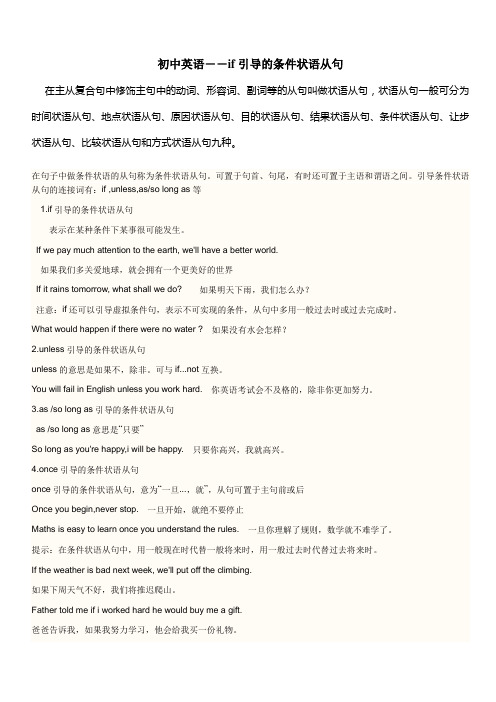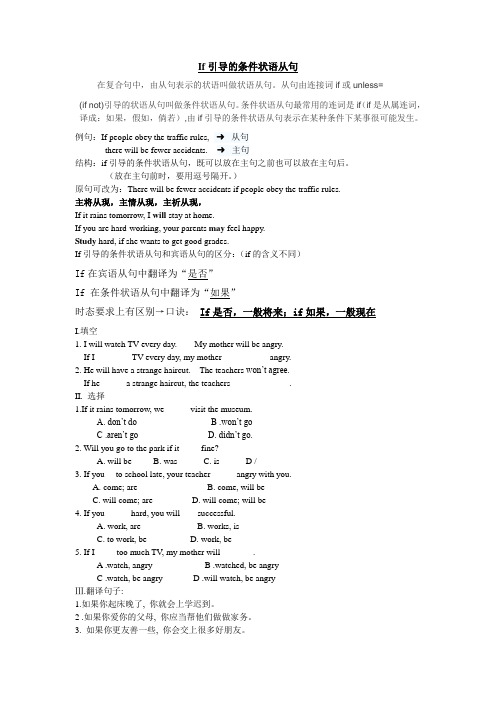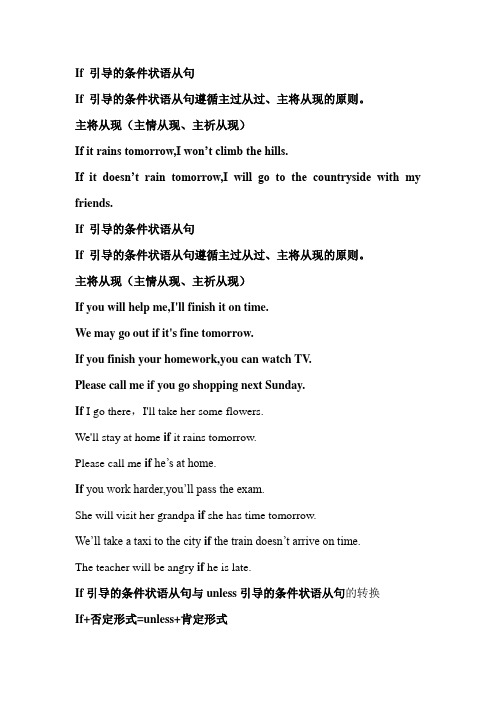if引导的条件状语从句
初中英语——If引导的条件状语从句

初中英语――if引导的条件状语从句在主从复合句中修饰主句中的动词、形容词、副词等的从句叫做状语从句,状语从句一般可分为时间状语从句、地点状语从句、原因状语从句、目的状语从句、结果状语从句、条件状语从句、让步状语从句、比较状语从句和方式状语从句九种。
在句子中做条件状语的从句称为条件状语从句。
可置于句首、句尾,有时还可置于主语和谓语之间。
引导条件状语从句的连接词有:if ,unless,as/so long as等1.if引导的条件状语从句表示在某种条件下某事很可能发生。
If we pay much attention to the earth, we'll have a better world.如果我们多关爱地球,就会拥有一个更美好的世界If it rains tomorrow, what shall we do? 如果明天下雨,我们怎么办?注意:if还可以引导虚拟条件句,表示不可实现的条件,从句中多用一般过去时或过去完成时。
What would happen if there were no water ? 如果没有水会怎样?2.unless引导的条件状语从句unless的意思是如果不,除非。
可与if...not互换。
You will fail in English unless you work hard. 你英语考试会不及格的,除非你更加努力。
3.as /so long as引导的条件状语从句as /so long as意思是“只要”So long as you're happy,i will be happy. 只要你高兴,我就高兴。
4.once引导的条件状语从句once引导的条件状语从句,意为“一旦...,就”,从句可置于主句前或后Once you begin,never stop. 一旦开始,就绝不要停止Maths is easy to learn once you understand the rules. 一旦你理解了规则,数学就不难学了。
If引导的条件状语从句

→主句谓语中也可以用had better(not)do,提建议 例句:如果你想减肥,你最好锻炼。
eg:If you want to lose weight,you had better take some
2021/6/20
3
exercise.
if的反义词:if...not...=unless,意思是:“如果不,除非”
W--i-t-h--y--o-u--r--h--e-l-p-, I’ll finish my job soon. 如果你帮我,我将很快完成我的工作。 If there is no water, fish may die.
Fish may die w--i-th--o--u-t--w--a--t-e-r--. 如果没有水,鱼可能会死。
I won’t go there unless பைடு நூலகம் hear from you.(同义句 if ) don’t
I won’t go there _____ I _____hear from you. I won’t go to the party if I am not invited. (同义句)
I will go out tomorrow if it doesn’t rain. = If it doesn’t rain, I will go out tomorrow.
If 引导的宾语从句放在主句之后;而if引 导的状语从句可放在主句之前也可放在主 句之后
If 引导的条件状语从句放于句首时多用逗号隔开;
时态:
if引导的条件状语从句, 主句用一般将来时(will),从句用一般现在时。
→主句谓语中也可以含有情态动词, 如:must,can,could,should等
If引导的条件状语从句

If引导的条件状语从句在复合句中,由从句表示的状语叫做状语从句。
从句由连接词if或unless=(if not)引导的状语从句叫做条件状语从句。
条件状语从句最常用的连词是if(if是从属连词,译成:如果,假如,倘若),由if引导的条件状语从句表示在某种条件下某事很可能发生。
例句:If people obey the traffic rules, ➜从句there will be fewer accidents. ➜主句结构:if引导的条件状语从句,既可以放在主句之前也可以放在主句后。
(放在主句前时,要用逗号隔开。
)原句可改为:There will be fewer accidents if people obey the traffic rules.主将从现,主情从现,主祈从现,If it rains tomorrow, I will stay at home.If you are hard-working, your parents may feel happy.Study hard, if she wants to get good grades.If引导的条件状语从句和宾语从句的区分:(if的含义不同)I.填空1. I will watch TV every day. My mother will be angry.If I ________TV every day, my mother _____ _____angry.2. He will have a strange haircut. The teachers won’t agree.If he _____ a strange haircut, the teachers______ _______.II. 选择1.If it rains tomorrow, we _____ visit the museum.A. don’t do B .won’t goC .aren’t go D. didn’t go.2. Will you go to the park if it ____ fine?A. will beB. wasC. is D /3. If you __to school late, your teacher _____ angry with you.A. come; areB. come, will beC. will come; areD. will come; will be4. If you _____ hard, you will ___ successful.A. work, areB. works, isC. to work, beD. work, be5. If I ____ too much TV, my mother will _______.A .watch, angryB .watched, be angryC .watch, be angryD .will watch, be angryⅢ.翻译句子:1.如果你起床晚了, 你就会上学迟到。
If引导的条件状语从句

--We’ll go to the library tomorrow if it __D_.
A. isn’t rain B. rain C. won’t rain D.will you do if you _____Ato the old folk’s
home visit?
2. I ____ her the answer if she ____me. A.can Dtell, will ask B. will tell, will ask C. would tell, ask D. will tell, asks
3. – What are you going to do tomorrow?
If 引导条件状语从句的时态为一般现在时
记住“主将从现”
7
----Sam, do you know if Alice ____to my party next week?
----I think she will come if she ____ free.
A comes; is B will come; will be C will come; is D comes; will be
If 引导的宾语从句放在主句之后;而if引 导的状语从句可放在主句之前也可放在主 句之后
5
1. Can you tell me if she can come to the meeting ?
2. She will not go there if it is rainy tomorrow.
3. I can’t guess if she will be angry . 4. If we help each other , we both will get
if引导的条件状语从句

if引导的条件状语从句if条件句:条件句用于陈述语气,表示假设的情况可能发生,其中if 是“如果”的意思。
用法例句①主句为一般将来时态,if从句用一般现在时态(即主将从现)。
We will stay at home if it rains tomorrow.如果明天下雨,我将要呆在家。
②主句中含有情态动词,if从句用一般现在时态。
If you finish your homework, you can go home now. 如果你做完了作业,你现在可以回家了。
③主句为祈使句,if从句用一般现在时态。
Don’t jump into the river if you feel very hot. 如果你感到很热,不要跳入河里。
④主句为过去将来时,if从句用一般过去时态(如果涉及到be动词,一律都用were)。
此时,表达的是和现实相反的推测,用虚拟语气。
If I were you, I wouldn’t do it like that.如果我是你,我就不会那么做的。
If you gave me some money, I would be very happy. 如果你给我一些钱,我就会很高兴的。
构成条件从句主句时态If+一般现在时主语+shall/will+动词原形例句If he comes, he will take us to the zoo.1) 用法:(1)条件状语从句通常由连词if引导,意为“如果、假如”,主句不能用be going to表示将来,而应该用shall,will。
If you leave now, you are never going to regret it. (错误)If you leave now, you will never regret it. (正确)(2)if “如果”,引导条件状语从句,主句用一般将来时,从句则用一般现在时,如:If it rains tomorrow, I shan’t climb the hills.(3)另外,主句是祈使句或含有情态动词,从句也用一般现在时。
if 引导条件状语从句

if 引导条件状语从句【最新版】目录1.条件状语从句的定义和作用2.if 引导条件状语从句的用法3.实例分析4.注意事项正文一、条件状语从句的定义和作用条件状语从句是表示某种条件成立时,主句所表达的内容才会实现的从句。
它通常由连词 if 引导,用来表示在某种条件下,主句所述情况是否成立。
条件状语从句在英语中十分常见,具有很强的实用性。
二、if 引导条件状语从句的用法if 引导条件状语从句时,主句通常使用一般将来时,而从句则使用一般现在时。
这种时态搭配是为了表示在某种条件下,将来会发生的事情。
当然,在某些特殊情况下,也可以使用其他时态,例如主句使用一般现在时,从句使用一般将来时。
三、实例分析1.如果明天不下雨,我们会去公园。
(If it doesn"t rain tomorrow, we will go to the park.)在这个例子中,从句“it doesn"t rain tomorrow”表示一种条件,即明天不下雨,主句“we will go to the park”表示在这种条件下会发生的事情,即我们去公园。
2.如果你愿意,我们可以一起去看电影。
(If you are willing, we cango to the movies together.)在这个例子中,从句“you are willing”表示一种条件,即你愿意,主句“we can go to the movies together”表示在这种条件下会发生的事情,即我们一起去看电影。
四、注意事项在使用 if 引导条件状语从句时,需要注意以下几点:1.条件状语从句中的 if 通常可以翻译为“如果”,但有时也可以翻译为“是否”或“是不是”,具体翻译需要根据上下文判断。
2.条件状语从句中的时态搭配要正确,通常为主句一般将来时,从句一般现在时。
3.条件状语从句有时可以省略 if,直接用主句和从句连接,例如:It will be fine if it doesn"t rain.(如果下雨,天气就不会好了。
If引导的条件状语从句

1.If you __C___ to the party, you’ll have a great time.
A. will go B. went C. go D. going 2. I __D__ her the answer if she ____me.
A.can tell, will ask B. will tell, will ask C. would tell, ask D. will tell, asks
11. If you ___a_re_____(be) happy , we will be happy .
12. If she translates (translate ) the sentence word by word , she __w_il_l _g_e_t_(get ) its true meaning .
2 If I ___c_o_p_y____(copy ) your homework , I will cheat myself .
3 If she ___d_o_e_s_n_’t_g_e_t____(not get ) up early , she’ll miss the early bus .
4 If your mother___b_u_ys__ (buy) the book for you , it will be good for your study.
• 例如: If you have any questions to ask, please come to my office. 如果你有问题要问的 话,请到我办公室来。
1. if 在句中的含义不同 I want to know if he is a teacher.
If-引导的条件状语从句

If 引导的条件状语从句If 引导的条件状语从句遵循主过从过、主将从现的原则。
主将从现(主情从现、主祈从现)If it rains tomorrow,I won’t climb the hills.If it doesn’t rain tomorrow,I will go to the countryside with my friends.If 引导的条件状语从句If 引导的条件状语从句遵循主过从过、主将从现的原则。
主将从现(主情从现、主祈从现)If you will help me,I'll finish it on time.We may go out if it's fine tomorrow.If you finish your homework,you can watch TV.Please call me if you go shopping next Sunday.If I go there,I'll take her some flowers.We'll stay at home if it rains tomorrow.Please call me if he’s at home.If you work harder,you’ll pass the exam.She will visit her grandpa if she has time tomorrow.We’ll take a taxi to the city if the train doesn’t arrive on time.The teacher will be angry if he is late.If引导的条件状语从句与unless引导的条件状语从句的转换If+否定形式=unless+肯定形式You won’t pass the exam if you don’t work hard.=You won’t pass the exam unless you work hard.If you don’t go to bed earlier,you will feel tired in the morning. =Unless you go to bed earlier,you will feel tired in the morning. If it doesn’t rain,he will play with me tomorrow.=Unless it rains,he will play with me tomorrow.If she doesn’t come,I’ll go shopping alone=Unless she comes,I’ll go shopping alone.if条件状语从句与祈使句,and/or+一般将来时的句子转化If you get up early,you’ll get there on time.=Get up early,and you’ll get there on time.=Get up early,or you won’t get there on time.If you get up early,you won't be late for school.=Get up early,and you won't be late for school.=Get up early,or you will be late for school.If you don’t get up early,you won’t catch up with the early bus. =Get up early,and you will catch up with the early bus.=Get up early,or you won’t catch up with the early bus.if条件状语从句与without的句子转化If there is no water,we can't live.=We can't live without water.If there is no water,fish will die.=Fish will die without water.If you help me,I’l l finish the work soon.=With your help,I finish the work soon.if条件状语从句与祈使句,and/or+一般将来时的句子转化If you get up early,you’ll get there on time.=Get up early,and you’ll get there on time.=Get up early,or you won’t get there on time.If you get up early,you won't be late for school.=Get up early,and you won't be late for school.=Get up early,or you will be late for school.If you don’t get up early,you won’t catch up with the early bus.=Get up early,and you will catch up with the early bus.=Get up early,or you won’t catch up with the early bus.1. your friend ,I'll tell you.eB.will comeesD.are coming2. If you go to college,you a good education.A.will getB.getC.getsD.got3.I want to know if they tomorrow.eB.will come C comes D.came4.Take enough exercise, you'll be in good heath.A.orB.soC.butD.and5.If it (not rain),he (play)basketball withme tomorrow.6.If Uncle Lan ______(come),I______(call)you up.7.She must see a dentist if she______(have)a toothache.8.Please wake me up if he______(come)back.9.Hurry up!Or you ______(be)late again.10.If you don’t be quick,you(be)late.1.We won’t wait for you you can’t arrive on time.A.untilB.whenC.afterD.if2.The children will go to the zoo if it (not rain)this Saturday.3.If she work hard,she be able to go to colleage.A.not,notB.won’t,won’tC.won’t,doesn’tD.dpesn’t,won’t4.If I run every day,I (be)healthier.5.If it (not rain),he (play)with me tomorrow.6.She must see a dentist if she (have)a toothache.7.Study hard,or you (not pass)the test.8.If you (not go)to bed earlier,you will feel tired in the morning.9.If he (be)free tomorrow,he will come to your birthday party.10.We will go to the zoo if it (not snow)tomorrow.。
- 1、下载文档前请自行甄别文档内容的完整性,平台不提供额外的编辑、内容补充、找答案等附加服务。
- 2、"仅部分预览"的文档,不可在线预览部分如存在完整性等问题,可反馈申请退款(可完整预览的文档不适用该条件!)。
- 3、如文档侵犯您的权益,请联系客服反馈,我们会尽快为您处理(人工客服工作时间:9:00-18:30)。
语法10单元语法再现梁老师组稿2017-12-31
一、观察下面的句子
If you go to the party, you will have a great time.
If you do , you will be late.
If you do,you will be sorry.
If they have it today, half the class won’t come.
If we ask people to bring food, they will just bring potato chips and chocolate.
以上几个句子中“if”有相同的含义“如果”,引导条件状语从句逗号后面的句子是主句。
整个连起来的大句子叫主从复合句。
注意主句和从句的时态有什么特点。
总结:If引导的条件状语从句用一般现在时,主句用一般将来时。
简称“主将从现”
练习:(1)If you ______(come)here, you ___________(be) happy.
(2) If it _________(rain) tomorrow, we__________(not, go) to the park.
(3) If he _________(come) here, I ___________(call) you.
(4) If it ___________(not rain), we _________(have) a picnic(野餐).
(5) If we do that, more people _________(want) to play the games.
页脚内容1
(6) If they _______ that , the games _______(be) more exciting, too.
(7)What ______ happen if they_______ (have) the party today?
(8) What ______ happen if they _______ a video at the party?
(9) If he ______(take) a taxi, it _______(be) too expensive.
(10) If I _______(go) to the movies, I ____________(finish) my homework.条件状语从句的引导词还有“unless 除非(否则),如果不”
You won’t pass the exam unless you study hard.
Unless you deal with(处理)your problems, you will be unhappy.
二、同样when可以引导状语从句“主将从现”也适合
也就是说:when引导的时间状语从句也是一般现在时,
主句也是一般将来时。
What are you going to be when you grow up?
What is he going to be when he grows up?
三、“主将从现”的含义扩充
主:表示主句
页脚内容2
将:(1)主句是一般将来时
(2)主句是祈使句
(3)主句含有情态动词can、may、must/have to
从:表示状语从句
现:表示状语从句是一般现在时
例句:
(1)Don't go and play football if your homework ______________(not finish) .
(2)If it ____________(not rain) tomorrow, we ______________(go)to climb the hill.
(3)He wo n't leave until you _______________(agree)with him.
(4) You can cross the road when the lights _________(turn) green.
(5)I _____________(call)you as soon as he ____________(tell) me about the good news.
(6)The students will go to Summer Palace if it __________ tomorrow.
A. don't rain
B.won't rain
C. doesn't rain
D. isn't rain
四、if 翻译成“是否”,引导宾语从句,时态是:一般将来时。
例如:I don’t know if he will come tomorrow.
页脚内容3
V.
He asks me if I will be free .
V.
They want to know if they will have a party next week.
V.
注意把if的两个意思放在一道题中考试。
(主将从现宾将)Mary wants to know if Tom will come. If he comes, I will call Mary.
练习:
1.I don't know if it _____ tomorrow. If it ____ , we'll go out for a picnic.
A. will rain; doesn't rain
B. will rain; rains
C. rains ; will rain
2.---Does Ted tell you if he ___next Sunday?
---No, he doesn't. But if he ___. I'll give you a ring.
A. will come; will come
B. comes; will come
C. comes ; comes
D. will come; comes
3. ---I wonder if it ____tomorrow.
---Don't worry. If it ____, we'll stay at home.
A.rains; rains
B. will rain; rains
C. rains; will rain
页脚内容4
五、含有时间状语从句的主从复合句,常考时态有两种可能:
常考的引导词when 、as soon as(一------就------)、
not--- until--(直到------才---)
主句从句
1、主将从现
(1)He is going to be an engineer when he grows up.
主句:一般将来时when 引导的时间状语从句一般现在时(2)I will call you as soon as he comes here.
主句:一般将来时as soon as引导的时间状语从句一般现在时(3)I wo n’t go to bed
主句:一般将来时until引导的时间状语从句一般现在时
页脚内容5
2、第二种情况:主句和时间状语从句都是一般过去时态(要过去都过去)
I didn't go to work until I finished my homework.
我直到完成了作业才上床睡觉。
页脚内容6。
